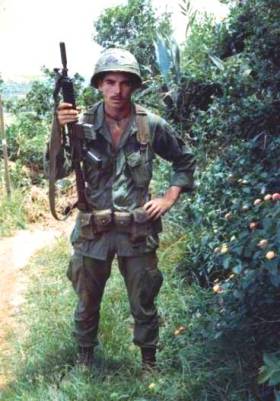
Stepping up
—Sgt. Porter Harvey

We were soldiers once and young, no question about that. But, although we were just kids over there, I think everyone who made it home from Nam, came back a different person with a different concept of what is really of value in life. We chose our friends more carefully then, and still do. And a phony stands out in the crowd like a red fire hydrant.
I’m not sure how this gradual change in my outlook came about. Maybe it was because every day boiled down to trusting your life to the two guys on either side of you.
Perhaps it was spending that extra ten seconds under fire with a fallen buddy at your feet, keeping on firing until the incoming stopped long enough for you get the guy on your back and carry him to safety. The old song, “He’s not heavy, he’s my brother,” took on a new meaning in Vietnam.
It could have been going the extra clicks on a LRRP just to be sure that what you reported back to the old man was the correct info. Or, crawling an extra few feet in a VC tunnel or bunker just to be sure it really was clear.
sgt haRVEY ON PATROL
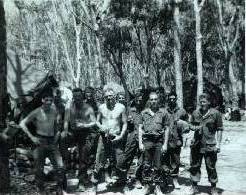
Sometimes I think it was being scared to death, yet still taking the point when the guy who was there had just gotten blown away. I remember carrying ammo to my best friend who was running low in the middle of a firefight - and both of us kidding about the “bees” picking at our uniforms. I guess if we had realized those bees were bullets, we wouldn’t have been so casual.
It could have been hanging in there with your unit rather than going to the rear because a little bullet made a small hole in you.
poRTER WITH SOME
platoon BUDDIES, 1967
Or, taking a six man ambush into the same spot where the day before one of your company’s platoons had been chopped up. Of course, you could have just skirted the area, who would know? Except you and your buddies.
But you couldn’t do that. You gave the old man your word - you had a commitment to do what you said you would do. And sometimes you went even further than that, like spending three days with no sleep searching for a soldier the VC had captured. You didn’t know the guy, not even his name, but you keep looking. And when you found what was left of him, you knew you’d live the rest of your life regretting that you were just a few hours late to save him.
Maybe you were dumb for being over there in the first place. That’s what everybody told you when you finally got home. But you did go because somebody said it was a service to your country, and you believed that was important. And since you were there, you were damn well going to do the best job you could do.
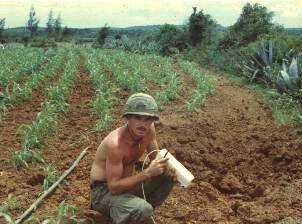
But it did change you - for life. It’s still hard for you to understand why, when someone gets his or her chance to step up, stand up, or speak up for the right thing, they don’t do it. Why doesn’t somebody stand by a friend when that friend has been wronged? Why do they walk away, instead of sticking up for him, even if it means burning some bridges? There was a time, even before Vietnam, when a man’s word was his bond. Where did we lose that? Why don’t people do what they say will do? Why is it that “nothing” is anybody’s fault anymore? Why isn’t anybody responsible for anything they do?
I don’t have the answers to those questions. I’d like to say that the experience of that long year in Southeast Asia made me more of a man. I know it showed me that honesty and character is more than a smiling face, a clean shirt, and a handshake. We who served our country in Vietnam are, and will ever be, changed men. But given the alternative of becoming what I see so much of in our nation today - I’ll just stay who I am, thank you. And wonder “why?” about the others.
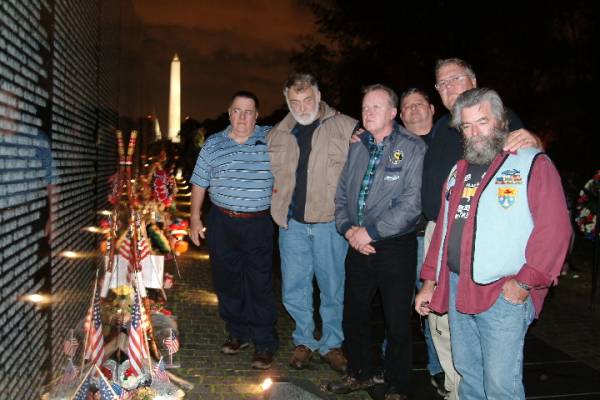
poRTER, FAR RIGHT, WITH SOME
a/2/12 BUDDIES AT THE WALL,2002
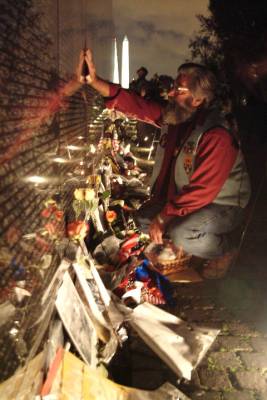
poRTER, PAYING HOMAGE TO
LOST BUDDIES OF 1967
Porter Harvey